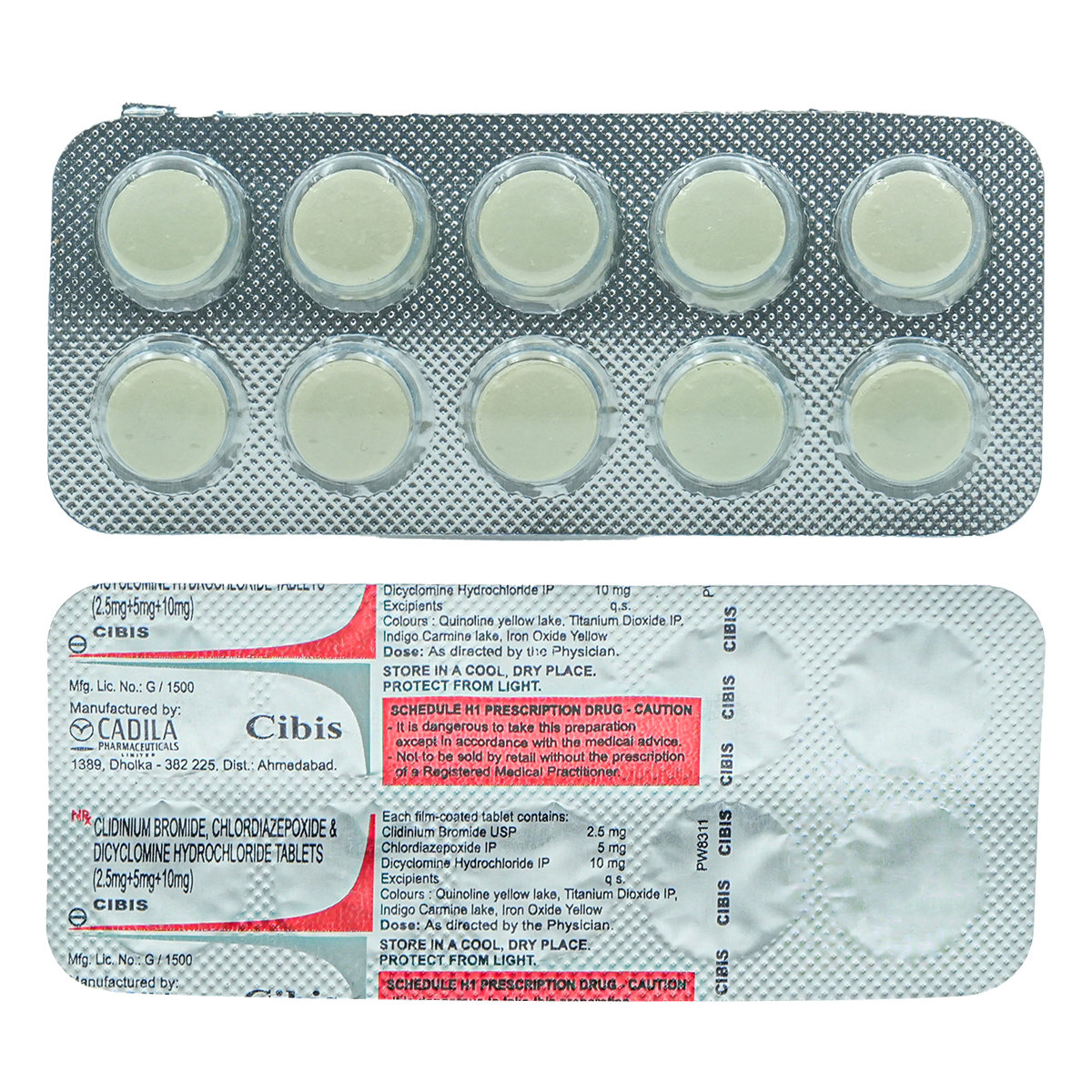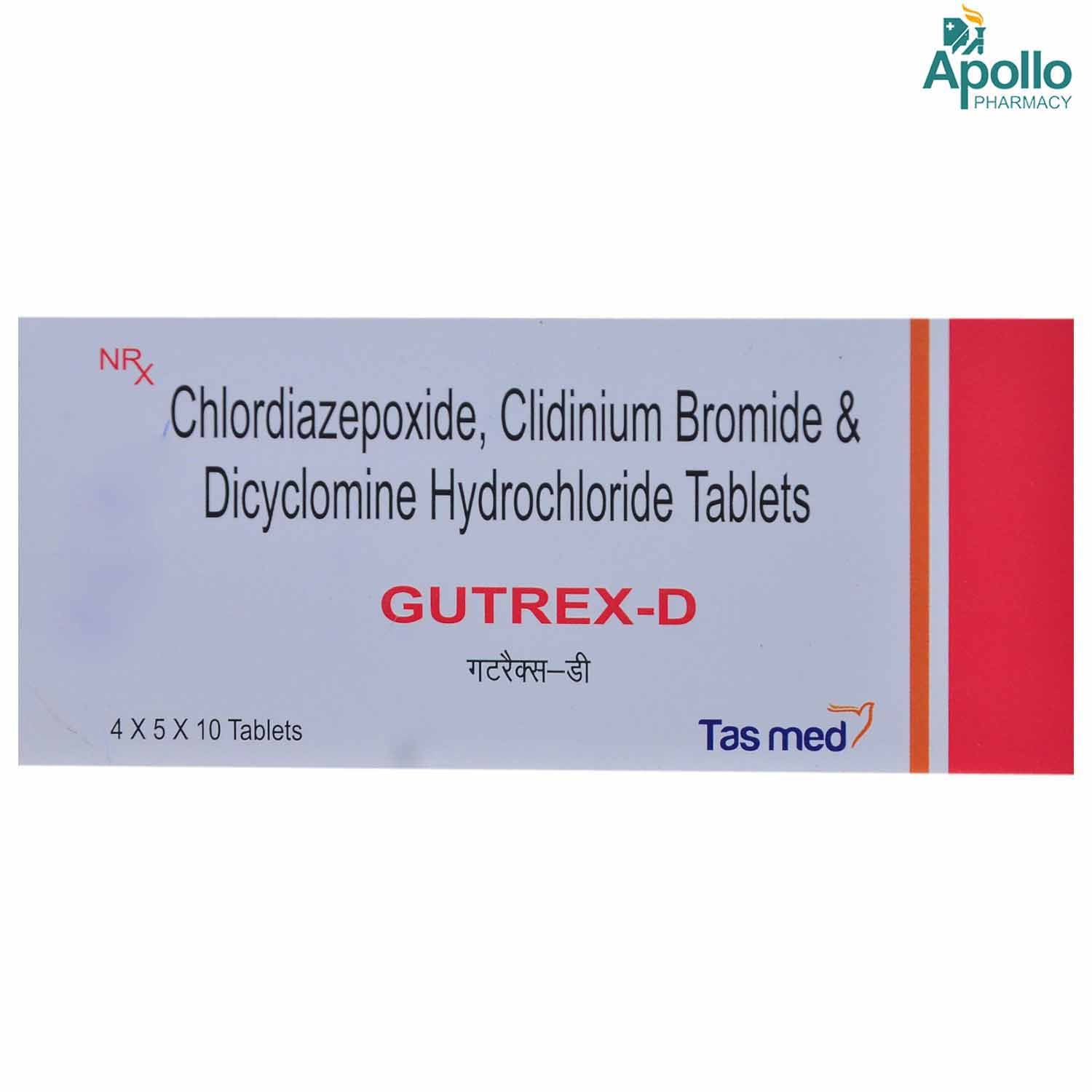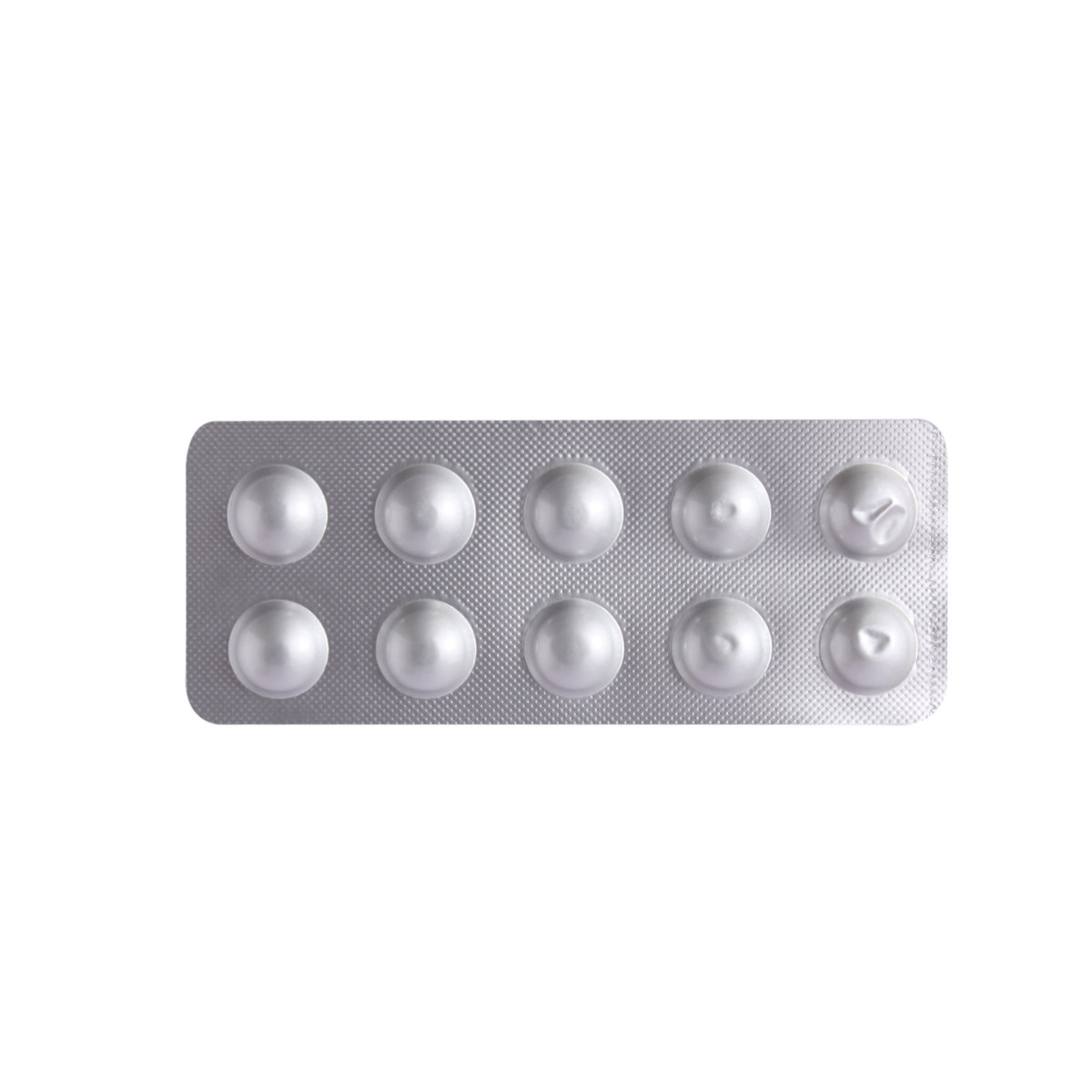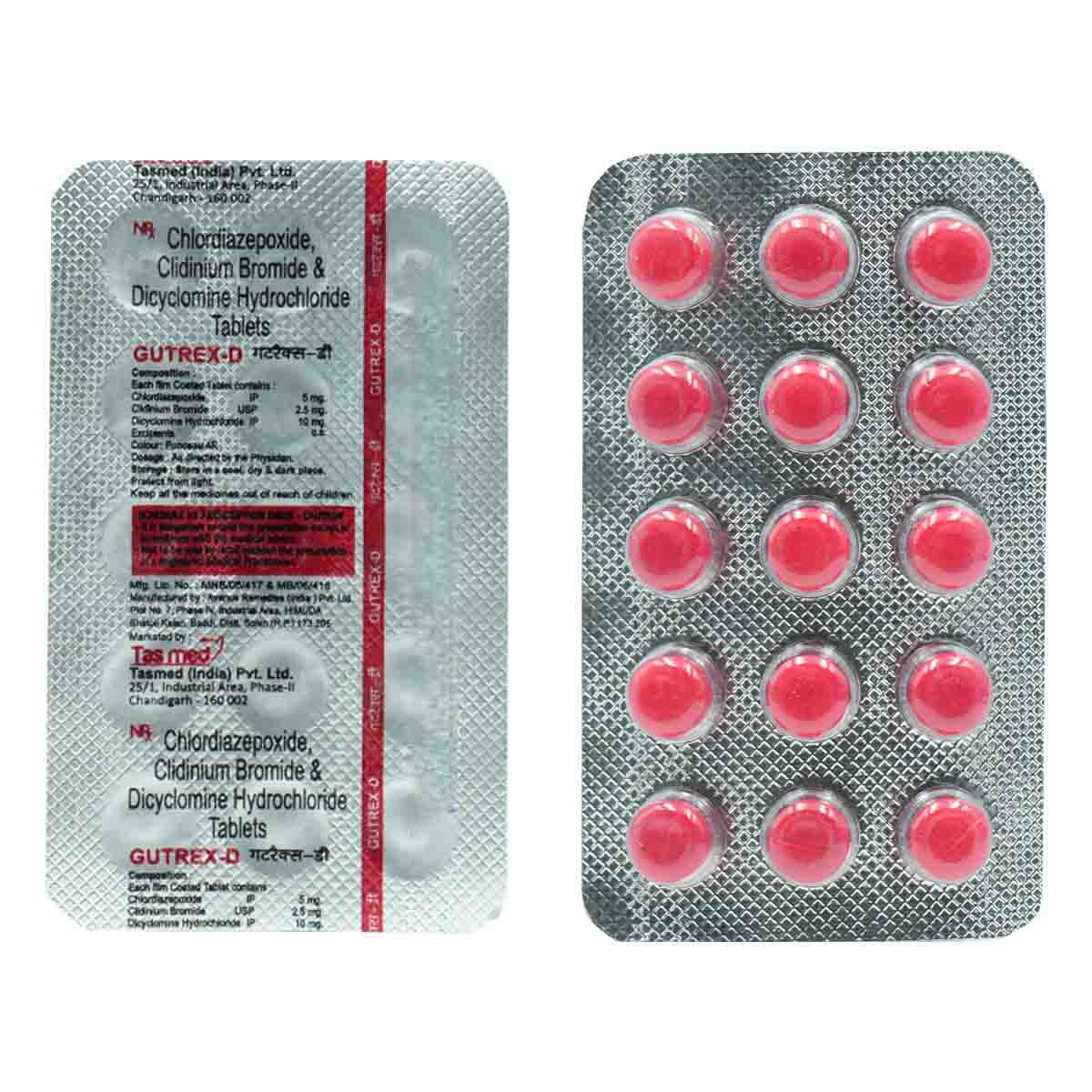Cibis Tablet 10's






MRP ₹56
(Inclusive of all Taxes)
₹8.4 Cashback (15%)
Provide Delivery Location
Online payment accepted
 Prescription drug
Prescription drugWhats That
Manufacturer/Marketer :
Consume Type :
Return Policy :
Expires on or after :
About Cibis Tablet
Cibis Tablet is a combination medicine used to treat irritable bowel syndrome, peptic ulcers, enterocolitis (swelling in the intestine), and symptoms related to intestinal infection. Irritable bowel syndrome is a common disease that affects the large intestine. Peptic ulcers are sores that develop on the lining of the stomach and intestine due to erosion of the stomach protective lining.
Cibis Tablet is a combination of three drugs, namely: Clidinium (anti-cholinergic), Chlordiazepoxide (benzodiazepine), and Dicyclomine (anti-cholinergic). Clidinium works by reducing stomach acid and decreases intestinal spasms. Dicyclomine helps in decreasing stomach cramps and spasms. Chlordiazepoxide decreases abnormal activity in the brain.
You are advised to take Cibis Tablet for as long as your doctor has prescribed it for you, depending on your medical condition. In some cases, you may experience certain common side-effects such as weakness, tiredness, dry mouth, nausea, constipation, and drowsiness. Most of these side-effects do not require medical attention and will resolve gradually over time. However, you are advised to talk to your doctor if you experience these side-effects persistently.
Avoid taking Cibis Tablet if you are pregnant or planning for pregnancy, as it may cause birth defects. Cibis Tablet may pass into breastmilk, so avoid taking Cibis Tablet if you are breastfeeding. Cibis Tablet may cause drowsiness, blurred vision or vision changes, do not drive or handle machinery unless you are alert. Avoid consumption of alcohol while taking Cibis Tablet as it may cause increased drowsiness. Keep your doctor informed about all the medicines you are taking, including prescription, non-prescription medicines and herbal supplements.
Uses of Cibis Tablet
Directions for Use
Medicinal Benefits
Cibis Tablet is a combination medicine used to treat irritable bowel syndrome, peptic ulcers, enterocolitis (swelling in the intestine), and symptoms related to intestinal infection. Cibis Tablet is a combination of three drugs, namely: Clidinium, Chlordiazepoxide and Dicyclomine. Clidinium and Dicyclomine belong to a group of medicines called anticholinergics, whereas Chlordiazepoxide belongs to a group of medicines called benzodiazepine. Clidinium works by reducing stomach acid and decreasing intestinal spasms. Dicyclomine helps in decreasing stomach cramps and spasms. Chlordiazepoxide decreases abnormal activity in the brain.
Storage
- Inform your doctor about dry mouth symptoms. They may adjust your medication regimen or prescribe additional medications to manage symptoms.
- Drink plenty of water throughout the day to help keep your mouth moist and alleviate dry mouth symptoms.
- Chew sugar-free gum or candies to increase saliva production and keep your mouth moisturized.
- Use saliva substitutes, such as mouthwashes or sprays, only if your doctor advises them to help moisturize your mouth and alleviate dry mouth symptoms.
- Avoid consuming smoking, alcohol, spicy or acidic foods, and other irritants that may aggravate dry mouth symptoms.
- Schedule regular dental check-ups to keep track of your oral health and handle any dry mouth issues as they arise.
- Inform your doctor about the nausea and discuss possible alternatives to the medication or adjustments to the dosage.
- Divide your daily food intake into smaller, more frequent meals to reduce nausea.
- Opt for bland, easily digestible foods like crackers, toast, plain rice, bananas, and applesauce.
- Avoid certain foods that can trigger nausea, such as fatty, greasy, spicy, and smelly foods.
- Drink plenty of fluids, such as water, clear broth, or electrolyte-rich beverages like coconut water or sports drinks.
- Use ginger (tea, ale, or candies) to help relieve nausea.
- Get adequate rest and also avoid strenuous activities that can worsen nausea.
- Talk to your doctor about taking anti-nausea medication if your nausea is severe.
- Record when your nausea occurs, what triggers it, and what provides relief to help you identify patterns and manage your symptoms more effectively.
- Inform your doctor about dizziness symptoms. They may adjust your medication regimen or prescribe additional medications to manage symptoms.
- Follow your doctor's instructions for taking medication, and take it at the same time every day to minimize dizziness.
- When standing up, do so slowly and carefully to avoid sudden dizziness.
- Avoid making sudden movements, such as turning or bending quickly, which can exacerbate dizziness.
- Drink plenty of water throughout the day to stay hydrated and help alleviate dizziness symptoms.
- If you're feeling dizzy, sit or lie down and rest until the dizziness passes.
- Track when dizziness occurs and any factors that may trigger it, and share this information with your doctor to help manage symptoms.
- Rest well; get enough sleep.
- Eat a balanced diet and drink enough water.
- Manage stress with yoga and meditation.
- Limit alcohol and caffeine.
- Physical activities like walking or jogging might help boost energy and make you feel less tired.
- Tell your doctor immediately if you experience symptoms of Nervousness, such as anxiety, jitteriness, or an increased heart rate, after taking medication or adjusting your medication regimen.
- Your doctor may adjust your medication regimen to alleviate symptoms of Nervousness. This can include switching to a different medication, reducing the dosage, or temporarily stopping the medication. Your doctor may also recommend alternative techniques like relaxation, mindfulness meditation, or journaling. These techniques can help reduce anxiety and Nervousness.
- Practice stress-reducing techniques, such as deep breathing exercises, yoga, or journaling, to help manage Nervousness.
- Engage in regular physical activity, such as walking or jogging, to help reduce anxiety and improve mood.
- Your doctor may advise considering cognitive-behavioural therapy (CBT) or other forms of talk therapy to address underlying anxiety or Nervousness.
- You should maintain regular follow-up appointments with your doctor to monitor nervousness symptoms, adjust treatment plans as needed, and discuss any concerns or questions.
- Avoid driving or operating machinery or activities that require high focus until you know how the medication affects you.
- Maintain a fixed sleeping schedule, create a relaxing bedtime routine and ensure your sleeping space is comfortable to maximize your sleep quality.
- Limit alcohol and caffeine as these may worsen drowsiness and disturb sleep patterns.
- Drink plenty of water as it helps with alertness and keeps you hydrated and for overall well-being.
- Moderate physical activity can improve energy levels, but avoid intense workouts right before bedtime.
Drug Warnings
Do not take Cibis Tablet if you are allergic to any of its contents. Inform your doctor before taking Cibis Tablet if you have glaucoma, enlarged prostate, bladder neck obstruction, vision problems, urination problems, depression, liver and kidney problems, if you are 65years or older, if you use opioid (narcotic) medicines such as codeine, hydrocodone, hydromorphone, methadone, morphine, oxycodone, and tramadol. Cibis Tablet may be habit-forming, so inform your doctor if you have a history of drug addiction or abuse. Please do not stop taking Cibis Tablet on your own as it might cause withdrawal symptoms. Avoid taking Cibis Tablet if you are pregnant or planning for pregnancy, as it may cause congenital disabilities (birth defects). Cibis Tablet may pass into breastmilk, so avoid taking Cibis Tablet if you are breastfeeding. Cibis Tablet may cause drowsiness, blurred vision or vision changes, do not drive or handle machinery unless you are alert. Avoid consumption of alcohol while taking Cibis Tablet as it may cause increased drowsiness. Cibis Tablet should not be given to children as safety and effectiveness were not established.
Drug-Drug Interactions
Drug-Drug Interactions
Login/Sign Up
Taking Cibis Tablet and Potassium citrate together can increase the risk of stomach ulcers, bleeding, and gastrointestinal injury.
How to manage the interaction:
Taking Cibis Tablet with Potassium citrate is not recommended, as it may lead to an interaction, it can be taken if prescribed by the doctor. However, if you experience severe stomach pain, bloating, sudden lightheadedness or dizziness, nausea, vomiting (especially with blood), decreased hunger, or dark, tarry stools, consult the doctor immediately. Do not discontinue any medications without a doctor's advice.
Co-administration of Pramlintide with Cibis Tablet can increase the risk of reduced gastrointestinal movement.
How to manage the interaction:
Taking Cibis Tablet with Pramlintide is not recommended, please consult your doctor before taking it. Do not discontinue the medication without consulting a doctor.
Co-administration of Cibis Tablet with Potassium chloride can increase the risk of stomach ulcers.
How to manage the interaction:
Taking Cibis Tablet with Potassium chloride is not recommended, as it can lead to an interaction, it can be taken if a doctor has prescribed it. However, if you experience severe stomach pain, bloating, sudden lightheadedness or dizziness, nausea, vomiting (especially with blood), decreased hunger, dark, tarry stools, consult the doctor immediately. Do not discontinue the medication without consulting a doctor.
Taking Cibis Tablet with Sodium oxybate increases the risk of breathing difficulty or low blood pressure.
How to manage the interaction:
Taking Cibis Tablet with Sodium oxybate is generally avoided as it can lead to an interaction, it can be taken if prescribed by a doctor. However, if you experience dizziness, shortness of breath, excessive sweating, or blurred vision, contact your doctor. Do not discontinue any medications without consulting a doctor.
Taking Potassium chloride with Cibis Tablet may increase the risk of irritant effects of potassium on your stomach and upper intestine.
How to manage the interaction:
Co-administration of Potassium chloride with Cibis Tablet is not recommended, it can be taken if prescribed by the doctor. However, if you experience symptoms such as severe stomach pain, bloating, sudden dizziness or lightheadedness, nausea, vomiting (especially with blood), decreased hunger, black, tarry stools, consult the doctor immediately. Do not discontinue any medications without consulting a doctor.
Taking Potassium citrate with Cibis Tablet may increase the irritant effects of potassium on stomach and upper intestine. This interaction is applicable only in tablet or capsule form of Potassium citrate.
How to manage the interaction:
Co-administration of Potassium citrate(tablet or capsule form) with Cibis Tablet is not recommended as it can lead to an interaction, it can be taken if prescribed by the doctor. However, if you experience stomach pain, bloating, sudden dizziness or lightheadedness, nausea, vomiting (especially with blood), decreased hunger, black, tarry stools, consult the doctor immediately. Do not discontinue any medications without a doctor's advice.
Co-administration of Secretin human with Cibis Tablet may decrease the therapeutic efficacy of Secretin human.
How to manage the interaction:
Taking Cibis Tablet with Secretin together can possibly result in an interaction, but it can be taken if your doctor has advised it. Do not discontinue any medications without first consulting your doctor.
Co-administration of Cibis Tablet with Topiramate may worsen effects like increased body temperature and sweating.
How to manage the interaction:
If you have to use Cibis Tablet and Topiramate together, your doctor may adjust the dose or monitor you more frequently to safely use both medications. Drink plenty of fluids during warm weather and when exercising and contact a doctor if you have decreased sweating or a fever. You may also experience drowsiness, dizziness, or lightheadedness when taking these medications together. Do not discontinue the medication without consulting a doctor.
Co-administration of Cibis Tablet with Zonisamide may worsen effects like increased body temperature and sweating.
How to manage the interaction:
If you have to use Cibis Tablet and Zonisamide together, your doctor may adjust the dose or monitor you more frequently to safely use both medications. You may also experience drowsiness, dizziness, or lightheadedness when taking these medications together. Do not discontinue any medication without consulting a doctor.
Co-administration of butorphanol with Cibis Tablet can increase the risk of side effects like decreased breathing rate, irregular heart rhythms, or problems with movement and memory.
How to manage the interaction:
Taking butorphanol and Cibis Tablet together can result in an interaction, it can be taken if your doctor has advised it. However, if you experience drowsiness, shortness of breath, palpitations, numbness in hands and feet, or hypersensitivity to light and noise, consult a doctor immediately. Do not discontinue any medications without consulting a doctor.
Drug-Food Interactions
Drug-Food Interactions
Login/Sign Up
Diet & Lifestyle Advise
- Eat smaller meals more often.
- Avoid smoking and alcohol consumption.
- Maintain a healthy weight by regular exercising.
- Avoid carbonated and caffeinated beverages.
- Practise relaxation techniques and avoid stress by doing yoga or meditation.
- Avoid foods such as high-fat food, spicy food, chocolates, citrus fruits, pineapple, tomato, onion, garlic, tea and soda.
- Avoid deep-fried and spicy foods.
- Foods containing probiotics may help in providing relief from gas and bloating.
Side Effects of Cibis Tablet
- Weakness
- Tiredness
- Dry mouth
- Nausea
- Constipation
- Sleepiness
- Blurred vision
- Drowsiness
Habit Forming
Therapeutic Class
All Substitutes & Brand Comparisons
RX
Not for online saleSerecon D Tablet 10's
A R K Company
₹25
(₹2.26 per unit)
55% CHEAPERRX
Not for online saleEnton Tablet
Apellon Biotech
₹3
(₹2.7 per unit)
46% CHEAPERRX
Out of StockNot for online saleNor-Ibs Tablet 10's
Thrift Pharmaceuticals Pvt Ltd
₹49
(₹4.41 per unit)
12% CHEAPER
Product Substitutes
Author Details
We provide you with authentic, trustworthy and relevant information
Drug-Diseases Interactions
Drug-Diseases Interactions
Login/Sign Up
FAQs
Cibis Tablet is a combination of three drugs, namely: Clidinium (anti-cholinergic), Chlordiazepoxide (benzodiazepine) and Dicyclomine (anti-cholinergic). Clidinium works by reducing stomach acid and decreases intestinal spasms. Dicyclomine helps in decreasing stomach cramps and spasms. Chlordiazepoxide decreases abnormal activity in the brain.
Constipation might be a side-effect of Cibis Tablet . Drink enough fluids and eat fibre-rich food if you experience constipation. Consult your doctor if the condition persists or worsens.
Please do not stop taking Cibis Tablet on your own as it might cause withdrawal symptoms such as fits, shaking, muscle cramps, stomach cramps, depression, vomiting, sleeping problems, and sweating. Consult your doctor if you experience any difficulty while taking Cibis Tablet , the doctor may gradually reduce the dose.
Dry mouth could be a side-effect of Cibis Tablet . Limiting caffeine intake, avoiding smoking and mouthwashes containing alcohol, drinking water regularly, and chewing sugar-free gum/candy might stimulate saliva and prevent drying of the mouth.
Irregular menstrual cycle might be a side-effect of Cibis Tablet . Consult your doctor if you miss your periods or if you have irregular periods while taking Cibis Tablet .
Cibis Tablet may be a habit-forming, especially in people with a history of drug addiction or abuse and in those who are alcoholic. Take Cibis Tablet only as prescribed by the doctor. Do not share Cibis Tablet with others.
Drug-Drug Interactions Checker List
- CODEINE
- HYDROCODONE
- MORPHINE
- METHADONE
- OXYCODONE
- TRAMADOL
- ACETAMINOPHEN
- WARFARIN
- CHLORPROMAZINE
- FLUPHENAZINE
- THIORIDAZINE
- ISOCARBOXAZID
- PHENELZINE
- SELEGILINE
- TRANYLCYPROMINE
- DULOXETINE
- FLUOXETINE
- SERTRALINE
- CYCLOBENZAPRINE
- PREGABALIN
- GABAPENTIN
- ALPRAZOLAM
- CETIRIZINE
- DIPHENHYDRAMINE
- METOPROLOL
- HYOSCYAMINE
- LOPERAMIDE
- PROMETHAZINE
Disease/Condition Glossary
Irritable bowel syndrome (IBS): It is a common disease that affects the large intestine. IBS is also known as irritable colon, spastic colon, spastic colitis, and mucous colitis. An irritable bowel syndrome is a group of intestinal symptoms that occur together. The exact cause is unknown, but common causes of IBS are acidity, stress, carbonated foods and beverages, irregular hormone levels, certain food and medications. Symptoms include abdominal pain, cramps, bloating, gas, constipation, and/or diarrhoea.
Peptic ulcers: Peptic ulcers are sores that develop on the lining of the stomach and intestine due to erosion of the stomach protective lining. Symptoms include nausea, changes in appetite, bloody or dark stools, unexplained weight loss, vomiting, and indigestion.
Enterocolitis: It is an inflammation of the digestive tract caused by bacteria, virus, parasites, fungus, or other causes. Symptoms include loss of appetite, nausea, vomiting, abdominal pain, mucus-like discharge from the rectum and diarrhoea.

Have a query?
Buy best Gastro Enterology products by
Abbott India Ltd
Sun Pharmaceutical Industries Ltd
Alkem Laboratories Ltd
Cipla Ltd
Torrent Pharmaceuticals Ltd
Intas Pharmaceuticals Ltd
Mankind Pharma Pvt Ltd
Lupin Ltd
Dr Reddy's Laboratories Ltd
Aristo Pharmaceuticals Pvt Ltd
Alembic Pharmaceuticals Ltd
Wallace Pharmaceuticals Pvt Ltd
La Renon Healthcare Pvt Ltd
Leeford Healthcare Ltd
Macleods Pharmaceuticals Ltd
J B Chemicals & Pharmaceuticals Ltd
Zydus Healthcare Ltd
Micro Labs Ltd
Zydus Cadila
Fourrts India Laboratories Pvt Ltd
Morepen Laboratories Ltd
Zuventus Healthcare Ltd
FDC Ltd
Eris Life Sciences Ltd
Cadila Pharmaceuticals Ltd
Medishri Healthcare Pvt Ltd
Alniche Life Sciences Pvt Ltd
Medley Pharmaceuticals Ltd
Tas Med India Pvt Ltd
Signova Pharma
Tablets India Ltd
Elder Pharmaceuticals Ltd
Wockhardt Ltd
Emcure Pharmaceuticals Ltd
Sanatra Healthcare Ltd
Glenmark Pharmaceuticals Ltd
Blue Cross Laboratories Pvt Ltd
East West Pharma India Pvt Ltd
Hetero Drugs Ltd
Indoco Remedies Ltd
Vasu Organics Pvt Ltd
Biological E Ltd
Primus Remedies Pvt Ltd
Akumentis Healthcare Ltd
Corona Remedies Pvt Ltd
Pfizer Ltd
Albert David Ltd
DR Johns Lab Pharma Pvt Ltd
Ajanta Pharma Ltd
Cadila Healthcare Ltd
Ipca Laboratories Ltd
Ordain Health Care Global Pvt Ltd
Systopic Laboratories Pvt Ltd
Ozone Pharmaceuticals Ltd
Foregen Healthcare Ltd
Medgen Drugs And Laboratories Pvt Ltd
Panacea Biotec Ltd
Samarth Life Sciences Pvt Ltd
Shine Pharmaceuticals Ltd
Adonis Laboratories Pvt Ltd
Dey's Medical Stores (Mfg) Ltd
Eskag Pharma Pvt Ltd
Hetero Healthcare Pvt Ltd
Indchemie Health Specialities Pvt Ltd
Meyer Organics Pvt Ltd
RPG Life Sciences Ltd
Troikaa Pharmaceuticals Ltd
Biochem Pharmaceutical Industries Ltd
Shreya Life Sciences Pvt Ltd
Sinsan Pharmaceuticals Pvt Ltd
3M India Ltd
Chemo Healthcare Pvt Ltd
Levin Life Sciences Pvt Ltd
Meridian Enterprises Pvt Ltd
Overseas Health Care Pvt Ltd
Saf Fermion Ltd
Sanzyme Pvt Ltd
Steris Healthcare
USV Pvt Ltd
Seagull Pharmaceutical Pvt Ltd
Votary Laboratories (India) Ltd
Win Medicare Ltd
Yuventis Pharmaceuticals
Aar Ess Remedies Pvt Ltd
Caplet India Pvt Ltd
Piramal Enterprises Ltd
Sanofi India Ltd
Cnx Health Care Pvt Ltd
Galpha Laboratories Ltd
Intra Labs India Pvt Ltd
Kinesis Pharmaceuticals Pvt Ltd
Msn Laboratories Pvt Ltd
Olcare Laboratories Pvt Ltd
Rapross Pharmaceuticals Pvt Ltd
Ronyd Healthcare Pvt Ltd
Saffron Therapeutics Pvt Ltd
Solariz Healthcare Pvt Ltd
Syndicate Life Sciences Pvt Ltd
Aurz Pharmaceutical Pvt Ltd
Biophar Lifesciences Pvt Ltd
Alcohol
Unsafe
Avoid consumption of alcohol while taking Cibis Tablet as it may cause increased drowsiness.
Pregnancy
Unsafe
Consult your doctor before taking Cibis Tablet if you are pregnant or planning for pregnancy, as Cibis Tablet may cause birth defects/congenital disabilities.
Breast Feeding
Unsafe
Cibis Tablet is excreted in small amounts in breast milk. Breastfeeding mothers should not take Cibis Tablet .
Driving
Unsafe
Cibis Tablet may cause drowsiness, blurred vision or vision changes. Do not drive or handle machinery unless you are alert.
Liver
Caution
Cibis Tablet to be taken with caution, especially if you have a history of Liver diseases/conditions. The dose may have to be adjusted by your doctor.
Kidney
Caution
Cibis Tablet to be taken with caution, especially if you have a history of Kidney diseases/conditions. The dose may have to be adjusted by your doctor.
Children
Unsafe
Cibis Tablet should not be given to children as safety and effectiveness were not established.








_0.jpg?tr=q-85)

